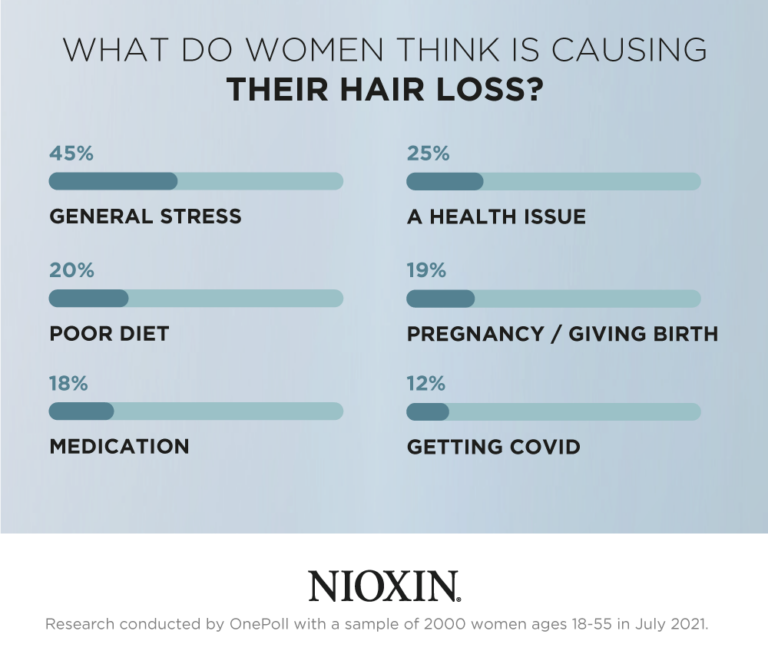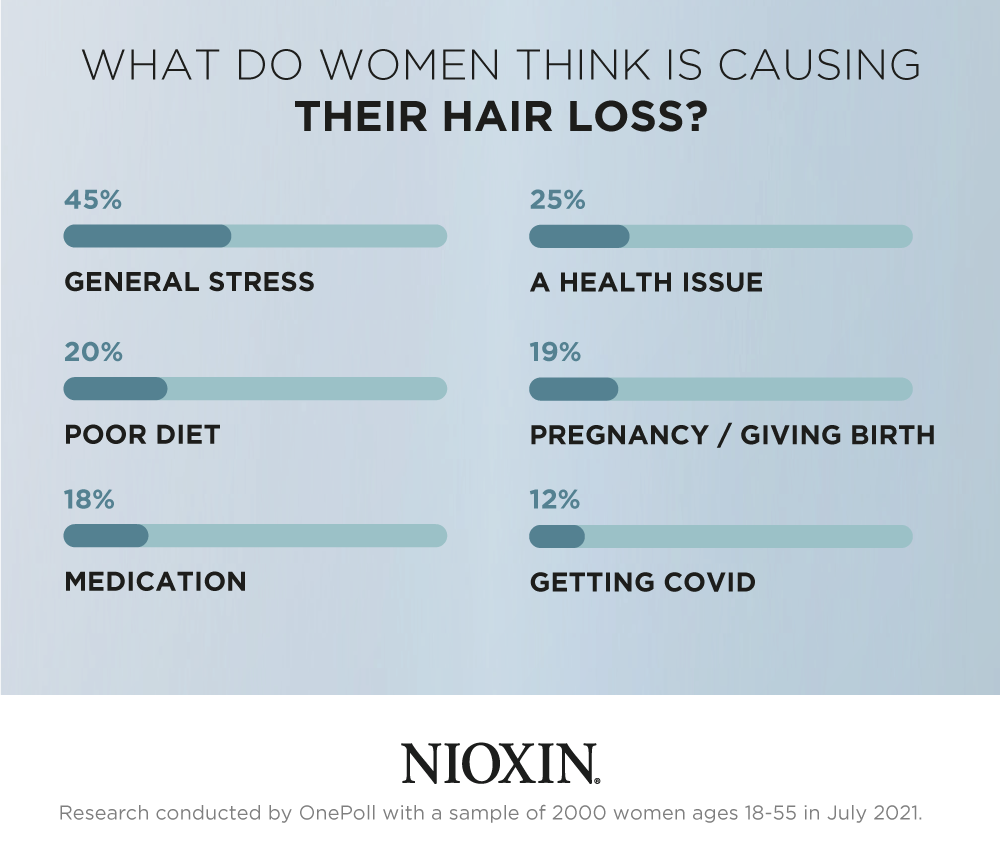
A study of 2,000 women found that while 31 per cent experienced ‘mild’ hair thinning, nearly one in 10 have lost whole clumps of hair in one go or noticed bald spots.
But with 79 per cent of women admitting their locks are a huge part of who they are, more than one in 10 sufferers have sought professional help due to the impact it had on their mental health.
Others have refused to look in mirrors (14 per cent), edited pictures before posting on social media (12 per cent) and cancelled dates (seven per cent).
The study, by anti-hair loss brand Nioxin [https://www.nioxin.com/en-GB/about-hair-loss/women-hair-loss-survey], also found 72 per cent of all women believe there is a stigma around hair loss in females.
As a result, 59 per cent would hide the condition from strangers, work colleagues and even their own friends and family.
This means many are suffering in silence, despite 38 per cent feeling that thinning hair would impact their mental health, and 29 per cent going as far as to say it would likely leave them feeling depressed.
Made in Chelsea star Liv Bentley first started to notice signs that her hair was thinning at the age of 16 after spotting a bald patch about the size of a two pence piece while on holiday in Majorca.
She said: “I assumed I probably ripped it out by brushing too hard. So, I left it as I thought it was normal.
“A few weeks later at school, I was brushing my hair in the shower and more had come out, so I panicked and started crying. I didn’t really know what it was.
“There’s no doubt that when my hair was thinning and I had bald patches, my confidence was greatly impacted.
“My hair has always been so important to me and it’s just such a major part of any woman’s appearance, so when it’s not at its best, it really does affect you.
“My advice is always to not ignore it as it is unlikely to go away without help and treatment.”
The study found that of those who have suffered hair loss, they first spotted signs of the condition at an average age of 34, but nearly one in 10 (11 per cent) noticed it as young as 18.
While 45 per cent put it down to general stress, more than one in 10 (12 per cent) believe it was a result of having Covid-19.
Others blamed their thinning hair on pregnancy (19 per cent), a poor diet (20 per cent) or a separate health issue (25 per cent).
jQuery(document).ready(function($) {
// We only want these styles applied when javascript is enabled
$(‘.gal_content’).css(‘display’, ‘block’);
// Initialize Advanced Galleriffic Gallery
var gallery = $(‘#thumbs_57229_1’).galleriffic({
delay: 0,
numThumbs: 0,
preloadAhead: 0,
enableTopPager: false,
enableBottomPager: false,
imageContainerSel: ‘#slideshow_57229_1’,
controlsContainerSel: ‘#controls_57229_1’,
captionContainerSel: ‘#caption_57229_1’,
loadingContainerSel: ‘#loading_57229_1’,
renderSSControls: true,
renderNavControls: false,
playLinkText: ”,
pauseLinkText: ”,
enableHistory: false,
autoStart: false,
enableKeyboardNavigation: true,
syncTransitions: false,
defaultTransitionDuration: 300,
onTransitionOut: function(slide, caption, isSync, callback) {
slide.fadeTo(this.getDefaultTransitionDuration(isSync), 0.0, callback);
caption.fadeTo(this.getDefaultTransitionDuration(isSync), 0.0);
},
onTransitionIn: function(slide, caption, isSync) {
var duration = this.getDefaultTransitionDuration(isSync);
slide.fadeTo(duration, 1.0);
// Position the caption at the bottom of the image and set its opacity
var slideImage = slide.find(‘img’);
caption.fadeTo(duration, 1.0);
},
onPageTransitionOut: function(callback) {
//this.hide();
setTimeout(callback, 100); // wait a bit
},
onPageTransitionIn: function() {
var prevPageLink = this.find(‘a.prev’).css({‘opacity’: ‘0.3’ , ‘display’ : ‘inline-block’, ‘cursor’ : ‘default’});
var nextPageLink = this.find(‘a.next’).css({‘opacity’: ‘0.3’ , ‘display’ : ‘inline-block’, ‘cursor’ : ‘default’});
// Show appropriate next / prev page links
if (this.displayedPage > 0)
prevPageLink.css({‘opacity’ : ‘1’ , ‘display’ : ‘inline-block’, ‘cursor’ : ‘pointer’});
var lastPage = this.getNumPages() – 1;
if (this.displayedPage < lastPage)
nextPageLink.css({'opacity' : '1' , 'display' : 'inline-block', 'cursor' : 'pointer'});
this.fadeTo('fast', 1.0);
}
});
/**************** Event handlers for custom next / prev page links **********************/
gallery.find('a.prev').click(function(e) {
gallery.previousPage();
e.preventDefault();
});
gallery.find('a.next').click(function(e) {
gallery.nextPage();
e.preventDefault();
});
});
But nearly one in six (15 per cent) still believe hair loss is something that is only suffered by men, with nearly three quarters claiming there is more of a stigma around it in women.
Almost two thirds (64 per cent) put this down to hair being considered such an important part of a woman’s appearance, while 44 per cent believe it’s because it’s not as common in women as it is men.
More than half (55 per cent) also blame it on a lack of women who have thinning hair, or hair loss, appearing on TV.
Mark Blake, Nioxin trichologist, added: “Hair loss in women is not something that should be kept quiet and is more common than you might think.
“But the stigma around it and the belief that it is only a ‘male condition’ is stopping women from seeking help which could not only improve their hair, but also their confidence and mental health as a result.
“Demand in our clinics from women suffering from hair loss has increased by 200 per cent, so you really are not alone.
“There are options out there if you are struggling with hair loss, such as Nioxin’s range which is designed to help those with thinning or fine hair, so that you don’t have to hide it from others or suffer in silence.”
To find out more about hair loss and it affects women, go to https://www.nioxin.com/en-GB/about-hair-loss/women-hair-loss-survey.























